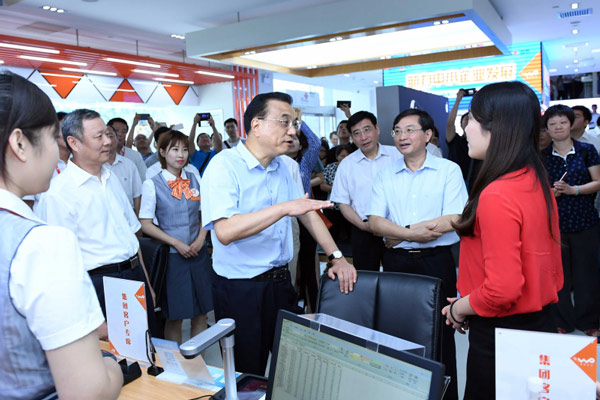
Premier Li Keqiang urged the country’s three major telecom service providers on July 31 to implement faster internet connectivity and make it more affordable while improving services for small and medium-sized businesses to help boost industrial upgrading and nurture new economic drivers.
“The information communication industry plays a crucial and fundamental role in China’s economic transition and industrial upgrading,” Premier Li said while visiting China Mobile Communications Corp, China United Network Communications Group Co and China Telecommunications Corp.
Premier Li focused on entrepreneurship, precise measures on cutting connectivity costs as well as technology innovation when visiting the headquarters of the three providers. At China Telecom, Premier Li learned that the company has already reduced its connectivity fees by 40 percent and its network flow has increased by 130 percent.
The three companies have taken a variety of measures to enhance speed and cut costs. This has improved corporate competence and reduced social costs in general, while telecom service providers also managed to gain larger consumer groups with increased internet flow, Premier Li said.
Premier Li’s visit follows an announcement by the providers on Aug 3 that they will scrap domestic long-distance and roaming charges beginning Sept 1, a month ahead of the deadline announced by the Ministry of Industry and Information Technology. This was promised by the Premier in his Government Work Report, delivered in March, and marks the end of over 20 years of roaming fees.
Premier Li, speaking at a symposium after the visit, said there is a huge potential in the information communication industry, especially when China’s information consumption, mobile payment and e-commerce businesses have experienced robust growth in recent years.
He encouraged the telecom companies to take bigger steps to cut costs for a dedicated internet access to SMEs, in particular.
Huge potential lies in the emerging information technology industries, such as cloud computing, the internet of things and intelligent terminals, which drive the upgrades of traditional industries, Premier Li said.
Premier Li encouraged the three providers, all being State-owned enterprises, to nurture innovation inside the company and better work with small businesses with complementary advantages.
Zhang Aihua, professor at the School of Economics and Management at Beijing University of Posts and Telecommunications, said cutting dedicated internet access fees for SMEs is important to boost China’s economic transition.
“Today’s internet exists in almost all kinds of businesses, while internet technology is a key part of their business for many startups,” Zhang said. “This is like making highways more affordable to drivers.”
